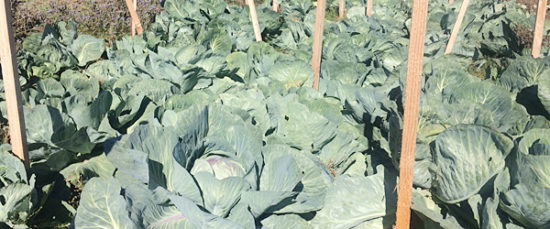
Last October, we bare-root transplanted a bed of Mariner cabbage in the west Delta Farm, intending it for a seed crop. Unfortunately, we planted it too late, and it had not matured enough in time to vernalize. Brassicae plants (cabbage, Brussels sprouts, kales, collards, etc.) need to spend a certain amount of time in low temperatures during their lifetime. The cold initiates the process of forming seed heads. This is called vernalization and most crops of northern European origin need to pass through that stage in order to set seed and propagate.
As a consequence of not vernalizing last year, the Mariner crop couldn’t set seed this year. But it can winter over and will set seed next year. What this “mistake” has enabled us to do, however, is to do a selection of only the best cabbage plants to go to seed, and harvest all the others that have gotten misshapen, too large, or damaged by insects. About 2/3 of the crop will be harvested out, but who would want extra-large or cone-shaped cabbage heads?
We are fortunate to have several excellent kraut makers in our area who actually prefer larger heads, as long as they still have flavor. And these Mariner heads do have flavor! The sale of this cabbage, albeit at a reduced cost, helps us offset some of the lost time and work on this crop. Seed crops are long-term projects and we usually don’t see a financial return for years. In this case, we’ll get a better selection and a little compensation as well.
